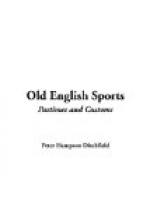In some most remote northern parts of England the farmer lights a wisp of straw, which he carries round his fields to protect them from the tare and darnel, the devil and witches. In some places they used to cover a wheel with straw, set it on fire, and roll it down a hill. A learned writer on antiquities tells us that the people imagined that all their ill-luck rolled away from them together with this burning wheel. All these customs are relics of the old fire and sun worship, to which our forefathers were addicted. Wrestling, running races, and dancing were afterwards practised by the villagers. Wrestling is a very ancient sport, and the men of Cornwall and Devon, of Westmoreland and Cumberland, were famous for their skill. A “Cornish hug” is by no means a tender embrace. Sometimes the people bore back to their homes boughs of trees, with which they adorned their doors and windows. At Oxford the quadrangle of Magdalen College was decorated with boughs on St. John’s Day, and a sermon preached from the stone pulpit in the corner of the quadrangle; this was meant to represent the preaching of St. John the Baptist in the wilderness.
At length the villagers, wearied with their exertions, retire to their cottage homes, marching in procession from the scene of their observances; and silence reigns o’er the village for a few short hours, till the sunlight summons them to their daily toil.
CHAPTER VII.
JULY.
“Swift o’er the mead
with lightning speed
The bounding ball flies on;
And hark! the cries of victory rise
For the gallant team that’s won.”
Cricket—Club-ball—Trap-ball—&
shy;Golf—Pall-mall—Tennis—
Rush-bearing.
At this time of the year all the cricket-clubs in town and village are very busy, and matches are being played everywhere. It may not therefore be inappropriate if I tell you in this chapter of the history of that game which has become so universally popular wherever our countrymen live. On the plains of India, in Australia (as some of our English cricketers have learnt to their cost), in Egypt, wherever Englishmen go, there cricket finds a home and a hearty welcome. But it is not nearly so ancient a game as others which I have already mentioned, although it had some fairly old parents, simple and humble-minded folk, who would have been greatly astonished to see the extraordinary development of their precocious offspring.
Kent and Sussex were the ancestral homes of cricket, which is thus described by an old writer—“A game most usual in Kent, with a cricket-ball bowled and struck with two cricket-bats between two wickets. The name is derived from the Saxon word cryc, baculus, a bat or staff; which also signifies fulcimentum, a support or prop, whence a cricket or little stool to sit upon. Cricket play among the Saxons was also called stef-plege (staff-play).”




